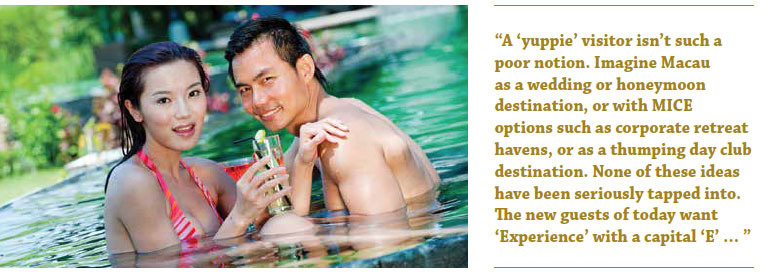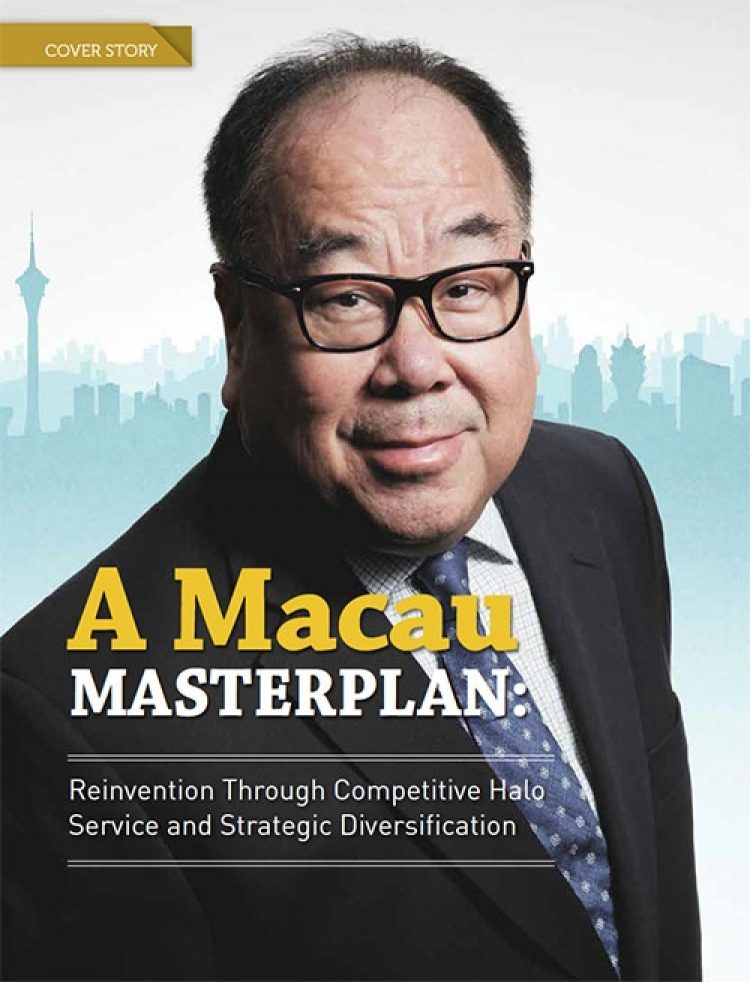Reinvention Through Competitive Halo Service and Strategic Diversification
By Professor Dr Brian To, bto@post.harvard.edu
Recent decisions and the general direction of the central government in China on unethical behavior have undoubtedly been felt by all the gaming operations in Macau and in other gaming locations in the region. Whilst a knee-jerk management reaction may well be to manage cost downwards, this is actually very short sighted. Such cost cutting typically highlights an organization’s service delivery gaps, unnecessarily declines staff morale and productivity and creates opportunities for employee dissatisfaction leading to perpetual grumbling.
No business professor would argue against the notion that downsizing (often euphemistically referred to as “right sizing”) brings about change with its concomitant uncertainty for employees, when what is actually needed is leadership that reinforces trust and productivity. Downsizing and rationalizing gaming and hospitality operations is an obvious first choice for those lacking in wisdom and innovative capability. A case in point is Genting’s Resorts World New York. A recent skirmish between management and employees has resulted in a number of dining outlets in the property closing, including the all-important in-house buffet. Those familiar with F&B operations in North American casinos will immediately recognize the stupidity of this decision, regardless of the nature of the underlying dispute.
HARDWARE WIN, SOFTWARE CHALLENGE
The growth of Asian gaming has been widespread over the last decade. Despite a rocky road over the last 18 months the longterm prognosis is for continued proliferation. Extension of the worldwide gaming expansion even further afield to Russia, central Europe and perhaps North Africa doesn’t seem so distant now. Even Macau operators are sharpening their pencils in pursuit of growth plans, revenue expansion and increased global market share. Technology has been adopted with enthusiasm with new gaming machines and security systems abounding. We’ve seen an expansion of facilities; both cloned themed resorts and innovative new concepts.
Clearly much deliberation, analysis and design has been invested in creating new integrated resorts and other gaming operations in Macau and elsewhere in southeast Asia. Whilst it’s difficult to challenge the speed and impressiveness of many of these new physical giants, it is more difficult to agree that the range of software within these mammoth structures has made an equally impressive impression on our minds. The continuing challenge for the private hospitality and gaming companies of Macau (and the public sector too) is creating an ambience and culture that is commensurate with the city’s lavish structures. It is time to support advances in the development of the Macau community and her human potential to inspire home grown innovation in products and services.
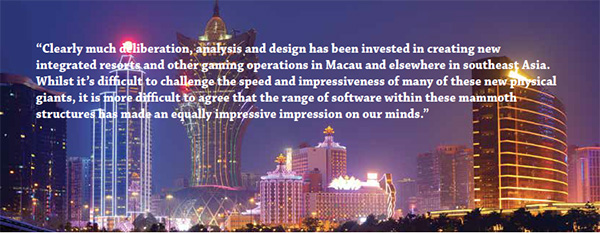
HUMAN ASSETS HOLE
Consider the employee development systems of these colossal companies. Most of the internal training systems and initiatives of the new casinos are Jurassic and trivial in nature. Companies continue to provide “mimic” role-play classes, which often leads to service that embarrasses both the employee and the guest with wooden conversations that are scripted rather than productive, impactful or motivating. These kinds of “monkey-see-monkey-do” or “plug-and-play” interactions frequently fail.
“Human resources development” is a widely used but generally misunderstood term. Whilst the name implies resources of the human kind are being truly developed and grown, that is often a fallacy. The reality is that many companies see their workers as little more than tools to be used. They are taught to go through the motions in production line fashion.
In two recent surveys I conducted of mid-career managers and supervisors of existing casino and resort facilities, not one executive could answer the question, “What is the single most important factor that affects communication between a supervisor and a team member, or between an employee and a customer?” This indicates a lack of understanding of the relationship between human behavior and productivity, and ultimately profitability.
Leaders and talent managers are failing to understand the benefits of developing meaningful human resource management strategies that foster innovation, productivity and motivation. Instead, human resource development efforts are mostly a grab bag of best practices, how-to tools and those cringe worthy monkey-see-monkey-do roleplays referred to above. Copying or adopting systems or methods from other companies is not a financially viable solution, given the fact that each organization has its own unique agenda, culture and challenges.
Given this lack of deep understanding amongst managers, it is unsurprising that few line staff possess the necessary skills, abilities or practical experience with guests or among themselves to deliver an exceptional level of service.
Exacerbating this problem, shareholders typically favor management that maximizes short-term profit rather than the interests of the wider stakeholder group, which includes employees, customers, vendors, shareholders and the communities in which the organization operates. As a result I have seldom found gaming, hospitality and entertainment companies to have truly thoughtful long range plans for talent and management development roadmaps that support their business strategies – instead limited term processes and tactical initiatives are introduced that provide minimal benefits in terms of fostering loyalty and morale.
Often human resource departments are operating merely as personnel administration centers, focussing on a short sighted governance model. They process the mundane paperwork of hiring, firing and annual leave requests, rather than recognizing the importance of true talent development.
There is, however, some light at the end of the tunnel. Over the last three years of listening to integrated resort gaming executives discuss the major challenges they face in operating in Macau, inevitably I’ve found managing human resources to be in the top three. So management is indeed conscious of the problem. But despite having the insight to recognize this corporate priority, few are comfortable on how to develop a strategy to engage creativity and advance their people in a deep and meaningful way.
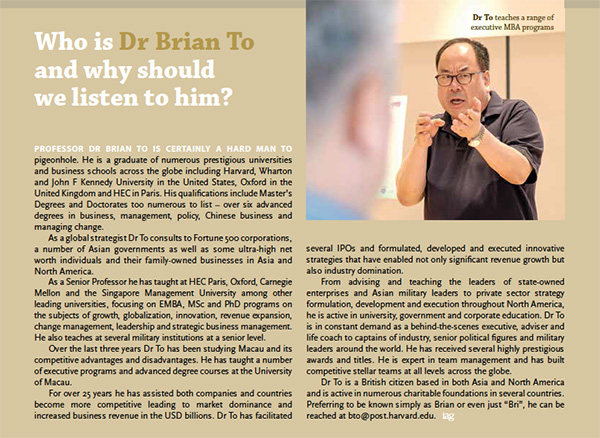
HUMAN ASSETS WHOLE
So what is the answer to Macau’s current shortfall in human assets development? The first step lies in a thorough understanding of the intersection between human performance and corporate profitability. Our employees are the practicing ambassadors of guest relations. The goal is concierge level hospitality and service initiatives. Every day hospitality companies in Macau are suffering a significant loss of revenue as a financial consequence of failing to achieve this goal.
In preparation for the next wave of mega luxury resorts to enter the Macau marketplace, it would be wise to recognize the value of focussed coaching to groom line employees. Such effective training would establish talent banks, offer rich learning opportunities and provide access to external functional experience and knowhow.

Staging and preparing employees to engage the future needs of the organization and the market in an applied and dynamic manner has to be a priority for all those whose organizations are dependent on delivering outstanding customer service and memorable experiences. Unfortunately, in most cases this is a wish list item. Few human resource departments are able to articulate their development initiatives well. So human resources needs to be rethought entirely, transitioning away from the focus on hiring quotas, pigeon holing and giving birth to endless new policies. This has to end if corporations are to demonstrate market leadership, market growth and healthy profitability on a sustained basis.
Competitive companies need to get ahead of the market, not wait for market conditions to change or to be told what to do by the CEO or Managing Director. A lesson could well be taken here from BMW, which has attempted to teach even its administrative and accounting staff how to be innovative.
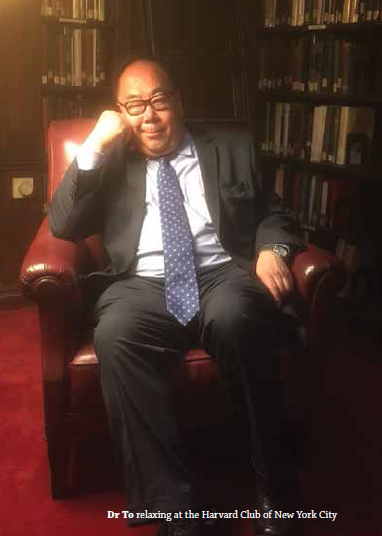
INTRODUCING HALO SERVICE
Just imagine if you will all floor employees such as those who directly provide primary level service to guests and customers no longer delivering zombie line platitudes, but instead their responses to each and every interaction conveyed enthusiasm, motivation and genuine interest. Imagine line staff having the ability to discuss professional effectiveness in business terms?
Welcome to Halo Service.
Halo Service is an elite form of service that when delivered induces not just satisfaction but emotions such as surprise, fulfilment, joy or inspiration to a potentially addictive extent. Halo Service is characterized by an absolute obsession with the needs of the service recipient and blends the task delivered with the behavior and style of delivery in an engaging, sensitive and authentic manner.
Halo Service is the antithesis of the regulation low-grade service we so often see in Macau today – those monkey-see-monkey-do artificially mimicked behaviors, salutations and actions.
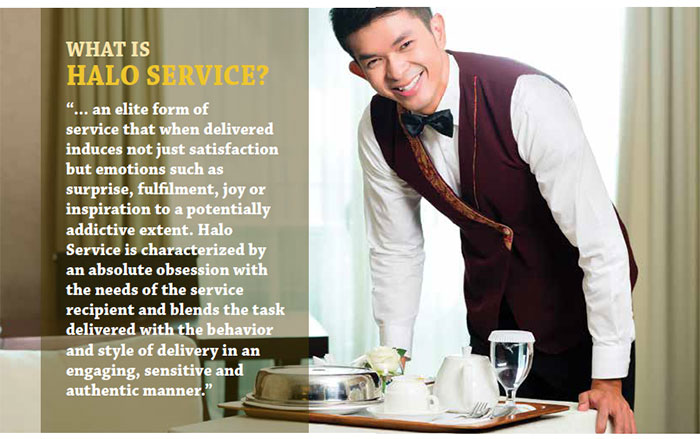
Macau’s latest wave of integrated resorts, casinos and shopping havens are ideally poised to provide leadership and innovation in delivering Halo Service, given they are new and relatively devoid of legacy issues. These properties can be great test beds, providing the opportunity to experiment in numerous strategic areas such as facilities, service delivery models, retail, MICE, hospitality, entertainment, recreation and many more. Operating within a hypercompetitive and global environment that will be continually fiercely competitive, it would be wise to create a Macau that focuses on Halo Service, ensuring continuous global leadership in gaming, hospitality, leisure, recreation and so on. A great foundation exists in Macau, but so much more work needs to be executed as a regional priority.
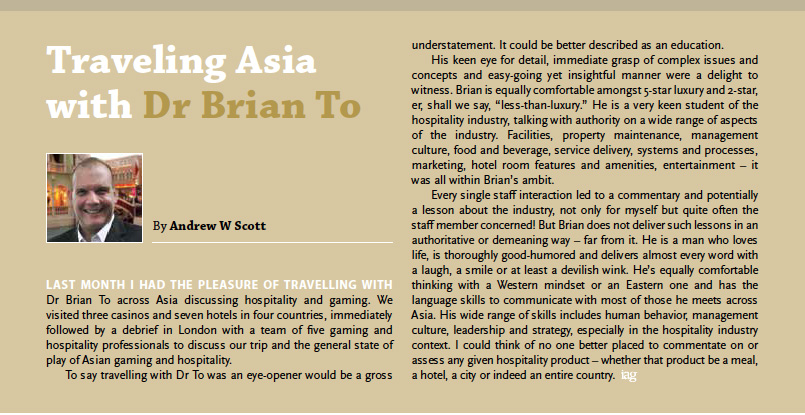
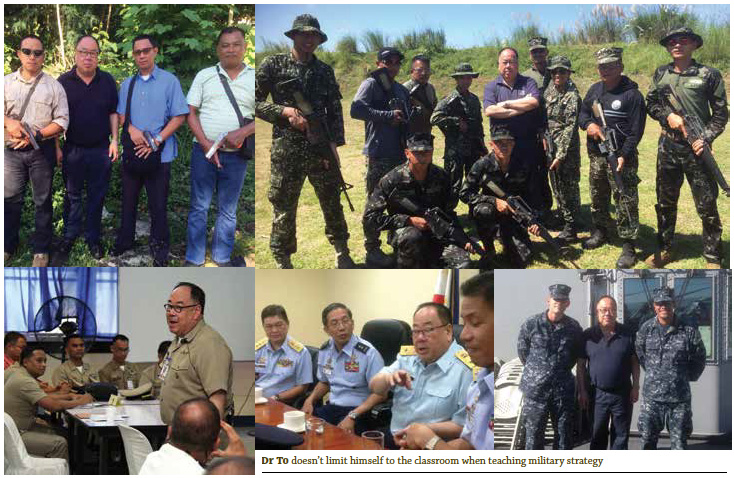
Halo Service is not limited to a company’s customers. Consider Google in California and study their incredibly pro-active human resource practices. This is Halo Service – by the company management to the company’s very own employees! It is in complete contrast to some organizations that define employee interaction success as game playing such as sneaky and duplicitous “bait and switch” moves with the quality of the in-house staff meals. Such internal marketing helps to create an omnipresent service culture throughout an organization.
STRATEGIC DIVERSIFICATION AND MANAGING CHANGE
We hear the government constantly trumpeting the need to diversify the Macau economy but what is further needed is a more competitive strategy and roadmap to implement this goal. Consider our entertainment and leisure approach for example. Macau is home to various cultural events such as the “festival of lights” we saw throughout the city this winter, and a regular program of sporting events repeated each year. Whilst some sporting events like dragon boat races, boxing and Grand Prix have earned global recognition, the wider world population may well not appreciate these wonderful sports. How is diversification to be genuinely achieved in a meaningful and sustainable way?
Imagine Macau transforming itself into a global epicenter for service industries. With the competitive advantage of a strong Halo Service culture, Macau could embark upon a twin-pronged approach combining the Halo Service concept with an authentic and strategic diversification strategy.
Political and economic agendas must be subordinated to the process of identifying new strategic opportunities to diversify. Consider when Hong Kong was the heart of banking and finance in China, and how Shanghai has emerged so significantly and so quickly, especially given the RMB’s new recognition as a reserve currency member. Within recent memory we can recall that India once commanded the call center market. But over the last five to ten years the Philippines has emerged as a leader in business process outsourcing (BPO). Change is coming, whether we like it or not, and we must respond in a strategic and thoughtful manner.
Let’s consider just some aspects of change in the Asian region. The RMB’s new reserve currency status together with the new Asian Infrastructure Investment Bank (AIIB) will forever change the landscape of Asian banking. Our approach to higher education is set to be transformed given the proliferation of international universities now entering the Asian region, such as the Harvard Center in Shanghai, the Singapore Stanford Partnership, the University of Chicago’s academic center in Hong Kong and the SMU-Yale program in Singapore. And right now we are living through once in a century changes in hard infrastructure such as the Three Gorges Dam, the Hong Kong-Zhuhai-Macau bridge, the expansion of China’s highspeed rail network and the program of numerous new and revitalized airports across mainland China.
While these transformational changes bode very well for the region, where is this paradigm of generational change in Macau’s service culture and service delivery? This is the key to driving revenues north since the downturn of the last 18 months but so much work remains to be done.
We need new initiatives of enhancing service culture and diversifying our economic base. Once Halo Service becomes endemic across Macau, we could leverage this culture in sectors away from hospitality and gaming. Areas worth considering may include deepening relationships with Macau’s visitors as well as our employees, globalizing Macau’s visitor base, building human capabilities and creating overseas kiosks and “welcome home” programs encouraging Macau citizens to return for reunions and homecomings. All of these initiatives would foster a Macau culture of inclusion and community.
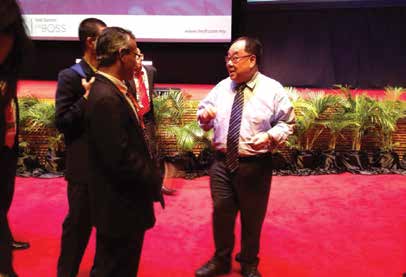
LEARNING LESSONS
Recent closures of Atlantic City casinos servicing the US northeast have made the conversation even more sobering. It is obvious to all observers that business is booming in Asia. But a reality lesser-realised in the Asian region is that business is also booming in New York with new houses and office towers sprouting like weeds – but where’s the conversation around the causes of casinos closing in the northeast corner of the US?
In 2015 four Atlantic City casinos closed and a fifth may follow. The city at one time had a monopoly on the east coast of the United States. The bleeding just won’t stop – shops and restaurants are also closing. The question is now whether the entire city can avoid becoming a bargain basement. Some sources claim that more than 7,500 jobs have been lost already, which means abandoned Cover Story businesses and more houses for sale. Just under a decade ago annual gaming revenue in Atlantic City was over US$5 billion. That revenue is now being spread over 30 casinos in three states – the result being that Atlantic City gaming revenue is now under US$3 billion annually. Next to take a hit may be city government employees, with perhaps another 500 jobs set for the chopping block, right in the midst of winter when business is traditionally slow. This is especially concerning given that social security benefits for laid off workers in that part of the world have only a limited timeframe.
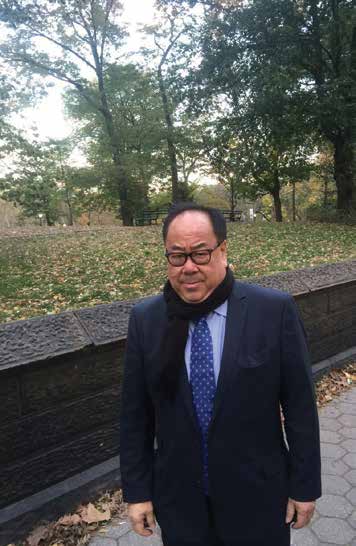
Whilst Macau has no major closures in sight the city could still benefit from the lessons Atlantic City is relearning since its gaming sector is now only half of what it was. It is time for Macau to make meaningful moves on its diversification strategy. Macau could begin to consider ideas such as becoming a medical or educational hub – particularly now that the University of Macau has relocated to its much larger campus on Hengqin Island. Research and technology centers or venture incubators could also prove most effective in a diversification strategy. Other initiatives could include creating space for entrepreneurs or venture capitalists. Professional services companies and knowledge workers could easily service Hong Kong, Shenzhen and Guangzhou, especially with Macau’s advantage of proximity to Zhuhai and other major cities in Southern China.

LEVERAGING A MACAU-WIDE HALO SERVICE CULTURE
The advantages of these diversification strategies are obvious. The unique culture that Macau enjoys by having a rich western European heritage blended with a dynamic Chinese culture affords a mega culture that has less tension than Hong Kong, its sister city across the water. All of these service industries lend themselves to a Halo Service culture. Macau has a professional service orientation – what a loss if we don’t develop and advance that culture to the next level. By 2020 Macau should create a Halo Service culture, setting a new standard of service that is unparalleled in the world. The attitude should be, “The Macau SAR is completely five star.”
This is an ambitious goal but who ever succeeded by thinking small? Compare this lofty ambition to the usual service and product cost cutting we so often see as an immediate response in lean times.
Macau has the opportunity to be the global leader in delivering Halo Service in every sector from gas stations to retail government offices to integrated resorts to restaurants and everything in between. The enthusiasm for Halo Service delivery could become infectious with the entire service sector providing a higher level of service. Educational, government and industry organizations would afford prestigious awards and recognition to those companies and individuals that deliver sustained Halo Service. It would be the service culture that would bind the city and reframe Macau to be synonymous with world-class service and Halo Service delivery.
Understanding the gaming VIP guest is obvious, but trying to understand the non-gaming guest is more difficult, yet potentially highly profitable by opening up an entirely new customer base. A “yuppie” visitor isn’t such a poor notion. Imagine Macau as a wedding or honeymoon destination, or with MICE options such as corporate retreat havens, or as a thumping day club destination. None of these ideas have been seriously tapped into.
The new guests of today want “Experience” with a capital “E”, not just to be ushered into VIP rooms by black suits for the duration of their visit. Of course enthusiastic gamers can also buy into these new options. What a missed opportunity not to engineer new and fresh innovative experiences for every level of visitor to Macau. Our goal should be to consistently reinforce emotional investment and attachment.
Surely, given a mandate and an agenda, new and innovative food products beyond the egg tart, pork chop bun and peanut brittle could be developed to establish Macau as a worldwide gastronomical destination. Even failing a government agenda and mandate, individual companies should consider service plus innovations such as Halo Service as a leap frog differentiation strategy – lest we continue to drag our feet with endless “copy copy” initiatives.
The residents of Macau find themselves with a wonderful and unique opportunity. We owe it to Macau’s people to give them every chance to capitalize on this opportunity by preparing them to engage in a fulfilling and competitive future.
